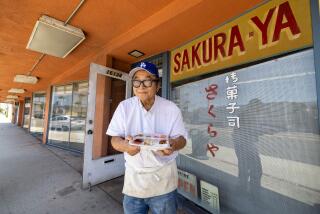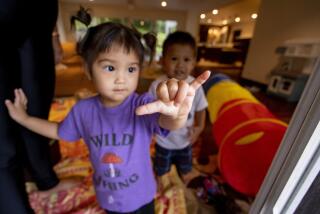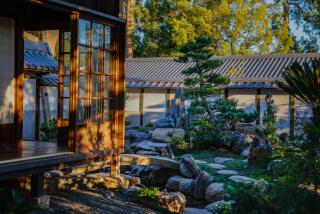Japanese Festival Steeped in Tradition
CAMARILLO — Wearing a shiny teal kimono, Fumi Akutagawa placed two spoonfuls of powered green tea into a ceramic cup. As her crimson lips formed a polite smile, she carefully poured piping hot water into the cup using a bamboo ladle.
She whisked the tea until it became foamy, bowed gracefully and handed her honored guest the cup. The formal Japanese tea ceremony--demonstrating the hospitality shown to revered friends and family during special occasions--was part of the eighth annual Japanese Cultural Festival held at the Camarillo Community Center on Sunday afternoon.
As an Army paratrooper stationed in Japan shortly after World War II, Amado Reynoso of Moorpark--one of about 600 people who attended the event--said he fell in love with the culture’s peaceful beauty and attention to detail.
“Everything is a meditation,” Reynoso said. “In the tea ceremony, everything matters--the folding of the napkins, the wiping of the utensils, the flower arrangements, the calligraphy. It’s a very spiritual ritual.”
The cultural festival featured other traditional Japanese art demonstrations and displays, including sumi, Japanese brush painting; bonsai, miniature tree arrangements; Kimekomi dolls; origami, paper folding art; and Ikebana flower arrangements.
Food covered half a dozen tables, including samples of sushi, gyoza, kamaboko fish cakes and other Japanese dishes. Activities included storytelling and demonstrations of kendo--Japanese fencing--and karate, as well as Okinawan dancing and drum music.
“I’ve always been interested in different cultures, and this has been great,” said Lillian Werndle of Camarillo, who attended the event with her daughter Ann Jourdan and son-in-law Charles of Tujunga.
“I’ve learned a lot about sword fighting and the techniques they use,” Charles Jourdan said. “When I looked at the swords up close, I was surprised to see they were made of bamboo. I found out they do that so the fighters won’t get hurt.”
Although the festival was upbeat, members of the Ventura County chapter of the Japanese American Citizens League, which sponsors the annual event, said they stage it for more serious reasons.
As a former prisoner at an American internment camp during World War II, Harry Kajihara said the event serves to educate people about the culture of Japan and dispel stereotypes about Japanese Americans.
The citizens league member and past president was a 13-year-old schoolboy living in Oyster Bay near Olympia, Wash., when federal agents hauled him and his migrant-farming parents to a prisoner-of-war camp in a remote area of the state. The family was among 120,000 people of Japanese heritage incarcerated after the Japanese bombed Pearl Harbor in 1941.
Now 70, the Oxnard resident said an anti-Japanese sentiment still exists in the United States.
“People look at my face and think I’m from Japan,” said Kajihara, who has been a math and engineering professor at Ventura College for 13 years. “I was born in the United States, but you would be surprised at how many people tell me, ‘Gee, you speak good English.’
“We want our counterparts to know--whether they’re African American, white, Hispanic or any other background--that we’re law-abiding citizens of this country, that we’re contributing to the greatness of this country,” said Kajihara, who was on stage with President Ronald Reagan in 1988 when Reagan offered an official apology to the surviving prisoners on behalf of the U.S. government.


